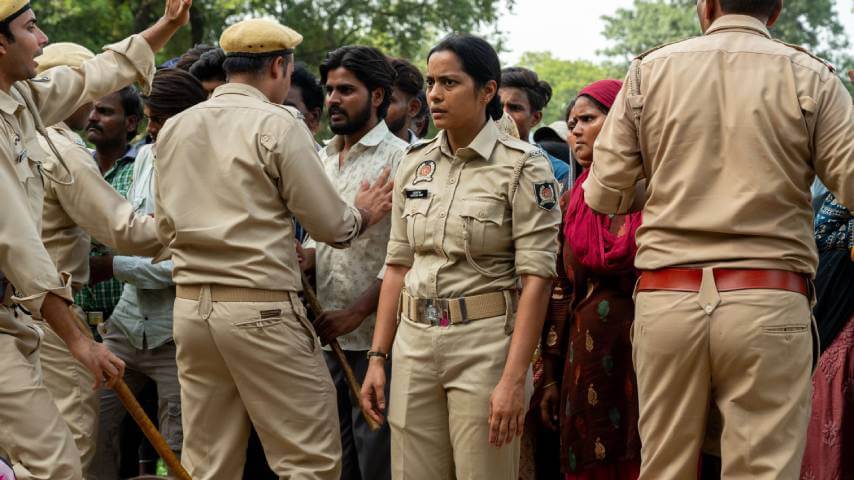A subverted police procedural crumbles into predictable moralizing in Santosh
Sandhya Suri's fiction feature debut lacks subtlety when it counts most.

Santosh Saini (Shahana Goswami), the heroine of the Indian cop drama Santosh, is a young widow whose husband, a police constable named Raman, was killed on duty. When we first meet her, she is still in grief and faced with a bleak future. Her bitter in-laws don’t want to help her, and without her husband’s job, she is due to lose their apartment. When she comes to the station to collect Raman’s belongings, one of her husband’s colleagues makes an unusual suggestion: Instead of subsisting on a meager widow’s pension, she could apply for a job with the police force herself under a government program called “compassionate appointment.”
Leaping forward an indeterminate length of time, the film finds Santosh as a trainee officer in a khaki uniform, newly arrived at a decrepit police station headed by the patronizing Inspector Thakur (Nawal Shukla). What passes for police work under his supervision is equal parts incompetence and indifference. Santosh and the other female officers work the “women’s desk,” which is officially a system for reporting domestic violence and sex crimes, though in practice mostly appears to be an excuse to collect small bribes—sometimes from the accuser and sometimes from the accused. When an illiterate lower-caste laborer shows up to report that his 15-year-old daughter is missing, Thakur and the other cops shoo him away.
Most PopularA few days later, the girl’s body is found in a well, bringing protests and media scrutiny to the station. Under political and public pressure, the powers-that-be assign the seasoned, middle-aged Inspector Geeta Sharma (Sunita Rajwar) to the case. She has her work cut out for her: No one’s bothered to visit the crime scene, collect evidence, or look for witnesses. Santosh quickly takes on the role of Geeta’s assistant and protégé, though it soon becomes clear that the older inspector’s affection for the rookie is not exclusively based on professional solidarity.
Making her fiction feature debut, writer-director Sandhya Suri works in a globally familiar style of contemporary, post-Dardennes neorealism: minimal exposition, documentary-esque location filming, jumpy scene transitions, blunt symbolism, no music. In its most compelling stretches, Santosh operates as a kind of subverted procedural in which every aspect of the investigation is, at best, an informality of dubious legal standing.
Before long, Geeta and Santosh zero in on a single suspect, a Muslim day laborer who appears to have skipped town, and the film heads into increasingly morally queasy territory. Through Santosh and Geeta’s conversation and actions, Suri depicts the way that ideas like justice and law are corroded, compromised, and ultimately nullified by the corrupt systems that were created to serve them. There’s a welcome dimensionality to these two characters. Though introduced as a kind of feminist role model, Geeta reveals herself to be simply a different species of insider, with different goals. And Santosh herself is no naïve idealist; though she is ostensibly out to bring closure to a severely impoverished community of lower-case Dalits, her class prejudices often peek through.
But whatever attention to detail Suri and her leads may bring to these characters is ultimately crushed by the grim predictability of a plot in which actions and reactions often feel extraneous. As it winds down, the tone of Santosh turns increasingly didactic and diagnostic, climaxing with a speech in which Geeta explains to Santosh that there are two kind of “untouchables” in Indian society: the kind that no one wants to touch, and the kind that can’t be touched. The implicit point is that, to maintain social order, they must police the former and protect the latter. It’s the kind of thesis statement that sticks out for its lack of subtlety, and given Santosh’s status as a Euro-British co-production, it’s likely directed more at the international audience than a local one.
Director: Sandhya Suri
Writer: Sandhya Suri
Starring: Shahana Goswami, Sunita Rajwar, Sanjay Bishnoi, Kushal Dubey
Release Date: December 27, 2024
GET A.V.CLUB RIGHT IN YOUR INBOX
Pop culture obsessives writing for the pop culture obsessed.
